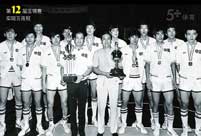 Chinese Air Force's combat group organizes actual-combat training
Chinese Air Force's combat group organizes actual-combat training How do politicians and royal families spend holidays?
How do politicians and royal families spend holidays?
 Heilongjiang issues orange alert for severe flood
Heilongjiang issues orange alert for severe flood
 Migrating flamingos gather in Kenyan lake for food
Migrating flamingos gather in Kenyan lake for food
 India launches first indigenous aircraft carrier
India launches first indigenous aircraft carrier
 Prisoners take wedding dress photos to welcome Qixi festival
Prisoners take wedding dress photos to welcome Qixi festival
 Zhou Dongyu promotes 'The Palace' in Beijing
Zhou Dongyu promotes 'The Palace' in Beijing
 Questioning China's real achievements
Questioning China's real achievements
 'Super Dan' wins Olympic final rematch
'Super Dan' wins Olympic final rematch
Translators at Northwest University, Xi'an, recently finished the first draft of an English version of a controversial Chinese novel and are looking for overseas publishers.
"Fei Du (The Abandoned Capital)", the first novel by Jia Pingwa, was originally published 20 years ago, and was quickly banned for its explicit sexual content and "vulgar style". It was reissued in 2009.
Hu Zongfeng, vice dean of the school of foreign languages, and his colleague Robin Gilbank have spent three years working on the translation.
"Robin has gone back to Britain and is looking for an international publisher," Hu said. "We hope to publish the English version of the book by the end of this year."
"Fei Du" has been translated into many languages, including Russian, French, Japanese and Vietnamese. The French version by Genevieve Imbot-Bichet won the Prix Femina Etranger, a French literature prize, in 1997.
Before the English version of "Fei Du", only one of Jia's novels had been translated into English. "Fuzao (Turbulence)", translated by American sinologist Howard Goldblatt, won the Pegasus Prize for Literature in the U.S. in 1991.
Set in Xi'an, "Fei Du" portrays the life of Zhuang Zhidie, an idle intellectual in the 1980s as China began to reform and open up.
"The novel reflects the psychology of Chinese people during this special period, especially intellectuals," said Hu.
The translators kept nearly all the text of the original work in tact. as Jia asked them to retain every single sentence of his novel.
Hu and Gilbank had difficulties in translating the obscure idioms and local dialect of the original, but as far as possible have retained the original meaning while making the texts readable.
"We translated the protagonist's name Zhuang Zhidie into Butterfly Zhuang, with an explanatory note on a proposition by ancient Chinese philosopher Zhuang Zi," Hu said.
Many domestic publishers have contacted them with offers to publish the work but, according to Hu, they prefer a prominent foreign publisher as the target readership is overseas.
"Fei Du" caused quite a stir when first published.
"Though 20 years have gone by, I still find it incisively sees through humanity, and its perception of society has stood the test of time," said Raymond Zhou, a critic and columnist.
"The translation of 'Fei Du' will help popularize Chinese literature overseas," Zhou added.
"Translation of successful novels can only help Chinese literature to win a place among international competitors and gain international readership and reputation," Zhou said.
"For example, the works of Mo Yan, winner of the 2012 Nobel Prize for Literature, have been translated and published in English, French, Swedish, Spanish, German, Italian and Japanese."
Zhang Yiwu, Chinese literature professor at Peking University, believes that since Chinese literature has an important role to play in the world, the number and quality of translations must be increased.
Zhang suggests that China learns from other countries and invests in support for translators who know the international market and understand Chinese culture.
"As an increasing number of foreigners are interested in China, more excellent Chinese literature is expected to be translated and go global," Zhang said.
 Helicopters, tanks seen during China-Russia joint drill
Helicopters, tanks seen during China-Russia joint drill SWAT members in Shenyang offer fast defense training class
SWAT members in Shenyang offer fast defense training class Dettifoss: Europe's most powerful waterfall
Dettifoss: Europe's most powerful waterfall  Argentina's president voices support of ruling party
Argentina's president voices support of ruling party 3D painting, new way to promote apartment sale
3D painting, new way to promote apartment sale Review: Asian Men's Basketball Championship
Review: Asian Men's Basketball Championship Air Force's combat group conducts flight training in joint drills
Air Force's combat group conducts flight training in joint drills Lightning causes fire in refinery in Venezuela
Lightning causes fire in refinery in Venezuela Yunnan Wild Animals Park opens to public
Yunnan Wild Animals Park opens to public Top 10 most dangerous jobs in the world
Top 10 most dangerous jobs in the world Geomancy city Ganzhou
Geomancy city Ganzhou 3 Chinese athletes advance to final of Women's Shot Put
3 Chinese athletes advance to final of Women's Shot PutDay|Week|Month